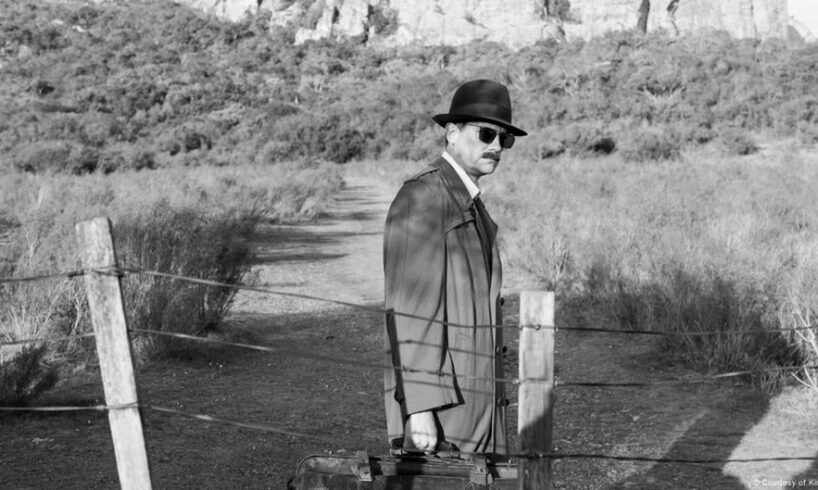
Josef Mengele was a Nazi physician who performed sadistic experiments on Jewish people at the Auschwitz death camp.
After the war ended, the so-called “Angel of Death,” who was gaining infamy for his murderous exploits in the name of science, managed to evade capture in Germany and escaped to Argentina with the help of former fellow members of the SS — the Nazi regime’s elite guard.
This is the starting point for “The Disappearance of Josef Mengele,” a film drama that details the war criminal’s successful attempts to escape trial as he moves from Buenos Aires to Paraguay via Brazil.
Directed by Russian filmmaker, theater director and Vladimir Putin critic, Kirill Serebrennikov, the German-language film debuted in May at the Cannes Film Festival, and is being released in cinemas across Germany this week.
Based on the award-winning 2017 book by French journalist and writer, Olivier Guez, the film is a bleak portrait of the roots — and consequences — of ideological extremism.
Dr. Josef Mengele (center) in 1944 with Auschwitz commandants Rudolf Höss (right) and Richard Baer, who oversaw the murder of over one million people at the death camp. Image: Public domain via Wikimedia Commons / Wikipedia
In pursuit of justice
While Nazi architects of the Holocaust like Adolf Eichmann ultimately faced justice — and execution — thousands of others escaped to South America with the support of collaborators, German immigrant sympathizers — and in the case of Argentina, the help of president Juan Peron, an ally of European fascism.
“The Disappearance of Josef Mengele” begins in 1956 as the German war criminal is living in exile in Buenos Aires under the name, Helmut Gregor. But Israeli secret service (Mossad) agents, West German officials and Nazi hunters are on his trail.
Starring August Diehl (“Inglourious Basterds”) in the title role, the film shows how money, connections, and a chameleon-like talent for disguise, help one of the world’s most wanted men evade international justice for decades. Mengele ultimately drowned to death at a Brazilian beach in 1979 due to a stroke.
The movie also reveals how the man who performed brutal eugenic experiments in Auschwitz can never escape his past. Aged, lonely, sick, and living under a false identity in Sao Paulo, Mengele’s son Rolf tracks him down and wants to know what really happened at Auschwitz. As a new generation demands the truth, Mengele can only spout the fascist lies used to justify his crimes.
Shoah survivor: ‘The biggest fish were let go’
To view this video please enable JavaScript, and consider upgrading to a web browser that supports HTML5 video
‘Path from ordinary person to criminal and sadist’
“What happens to war criminals when the war is over? Is there such a thing as divine justice? Will these people eventually be caught up by their deeds?” These are the questions that inspired Kirill Serebrennikov to adapt Olivier Guez’s non-fiction novel exploring the nature of evil. “The question of karma, punishment, justice — all of that has always interested me,” he added, during an interview conducted by the film’s distributor.
The director, a critic of the Putin regime who spent years under house arrest in Russia, purposely puts the viewer up close with Mengele, allowing them to understand his dogmatic way of thinking. This approach was partly inspired by German-Jewish intellectual Hannah Arendt, whose concept of the “banality of evil” — conceived in the wake of the trial of Adolf Eichmann — concludes “that monsters are no different from ordinary people,” said the Russian director.
“The point is to ask the viewer to put on Mengele’s mask in order to understand that the path from ordinary person to criminal and sadist can be frighteningly short,” he added. “In his mind, he doesn’t see himself as the embodiment of absolute evil at all. There were many other doctors in Auschwitz – why should he be the one to be blamed?”
The filmmaker insists that this approach should never evoke sympathy. “Sympathy for Mengele is impossible,” he said.
Kirill Serebrennikov sets out to portray the ‘banality of evil’ Image: DW
Serebrennikov was also inspired by the 2006 Jonathan Littell historical novel, “The Kindly Ones,” about a cultured SS officer living comfortably in postwar France who recounts his homicidal rampage through the eastern front.
Beyond its central protagonist, “The Disappearance of Josef Mengele” also focuses on the network of people across Europe and South America who protected, financed and hid Mengele until his death.
“Evil is not only Mengele, but also all these people,” said the director. “Many of them got away with it.”
A cautionary tale of ideological extremism
Not being a German speaker, Serebrennikov said he had to learn a lot about the way generations of Germans had reconciled with this history.
Currently based in Berlin, he interviewed actors, journalists, friends and producers to hear stories about their grandparents, their lives before and after the war.
“Many remained silent,” he said. “It’s a very painful subject. But perhaps the film has the potential to spark a major debate. That would be good.”
As far right ideology has reemerged across a wide global political spectrum, “The Disappearance of Josef Mengele” also aims to remind viewers about the dangers of dogma.
“We are currently surrounded by strongly ideological systems, and I hope that the film, in its precise description of ideological narrow-mindedness, will help prevent people from being taken in by ideologies of any kind,” added the film’s producer, Felix von Boehm.
Edited by: Brenda Haas
Justice and Nazi hunters: The trial of Adolf Eichmann
To view this video please enable JavaScript, and consider upgrading to a web browser that supports HTML5 video





